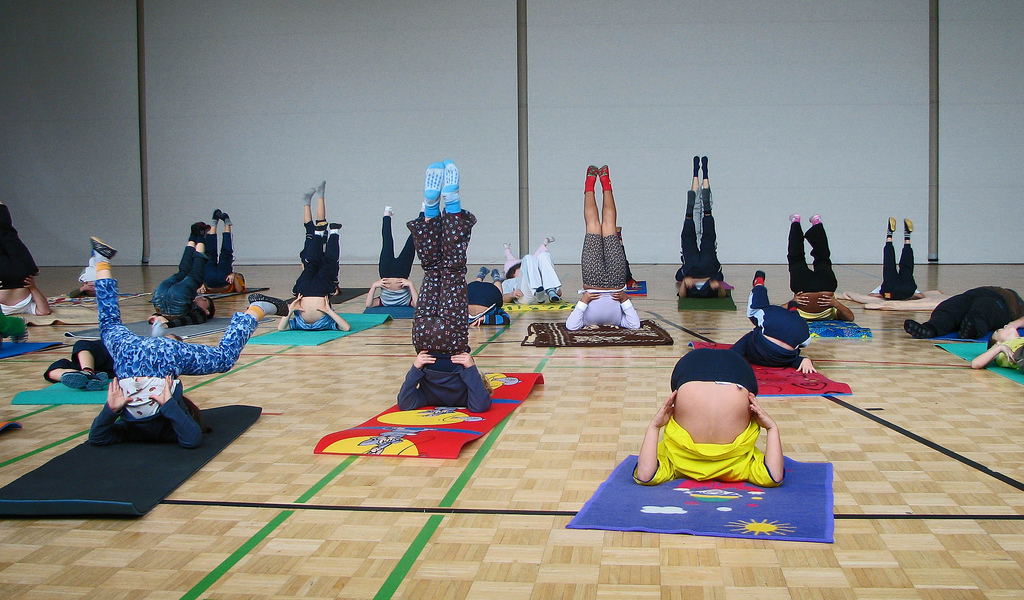Children lying on the floor in silence, with their eyes closed, listening to the music playing in the background, with the blinds down. These are students who take part in the yoga sessions provided during the course of their school day. This has now become a common sight in many Catalan schools as a result of teachers and psychologists confirming the numerous benefits yoga offers for children. For example, a few minutes of yoga a day can make children feel relaxed and calm in moments of tiredness or commotion. According to UOC experts, yoga improves memory, focus and academic performance in children, while also making them aware of their own emotions.
Bachelor's Degree in Psychology course instructor Amalia Gordóvil, referring to a study conducted in 2015 on the effects of teaching yoga at schools, points out that the discipline effected changes among the children in terms of mood, tension, anxiety, self-esteem and memory. In addition, the doctoral degree holder in Clinical Psychology goes on to say that, according to another study carried out in 2016 on the benefits perceived by a group of New York students after practising yoga for one year, the children themselves highlighted a capacity for increased self-regulation, stress reduction, greater self-esteem and improved physical conditioning and academic performance.
Gordóvil sees yoga as a beneficial practice with no adverse effects that allows children to take time out and become aware of their own bodies. This is a particularly important factor in helping children "learn to identify changes in terms of breathing and thoughts to watch out for", while also making them aware of tools that can help them to cope with stressful situations, such as changing the rhythm of their breathing. "When children discover that they can take charge of their own emotions, it’s a triumph because it gives them autonomy and makes them feel capable and empowered", says the GRAT centre psychologist.
Mireia Cabero, psychologist, emotional coach and UOC Bachelor's Degree in Psychology course instructor, explains that yoga develops a child’s ability to connect with their own inner self. "Yoga promotes knowledge of the internal world", while "education stimulates and promotes knowledge of the outside world".
Yoga also allows children to take a pause, says Cabero. "Stopping for a moment in order to feel, to reflect and to breathe", a skill that she considers fundamental to finding "balance and facing the challenges of life". On top of all that, the expert concludes that children who practice yoga are more capable of "managing their own emotions and relating more consciously with themselves, with others and with adversities".
Yoga helps the students to understand and manage their emotions
The relaxation and breathing techniques that children use at school also help with social interactions within the classroom by reducing student stress and improving the relationships between them. The FAROS report produced by Hospital Sant Joan de Déu asserts that working on emotional education in class improves the ambience at school, as well as the relationship that exists between classmates and the teacher and fosters aptitudes and skills that are very useful for the future.
UOC Faculty of Psychology and Education Sciences professor Toni Badia believes that "emotional education should be considered a priority in school educational systems and, therefore, should to be included as part of the educational project as a key element in an individual’s total development". He adds that in primary education the development of strong emotional education among students will also have a positive impact on certain fundamental aspects of their communication, social and civic skills, as well as their capacity for autonomy and personal initiative.
Reduced stress and increased concentration
Faculty of Health Sciences professor Diego Redolar explains that the brain is "critical" in the regulation of stress. There are various studies that point to the fact that meditation results in functional and structural changes in the regions of the brain that suffer the effects of stress. "Practising this technique could help minimize the effects that stress causes on the nervous system and, consequently, on our cognitive and emotional capacity", says the UOC neuroscientist.
The experts suggest that children should ideally start yoga after the age of 3 and that it should be taught in the form of a game. The introduction of these techniques in Catalan schools is a relatively recent phenomenon, although they have been used in schools in countries like the United States and France for decades now.
Experts UOC
Press contact
-
Editorial department

